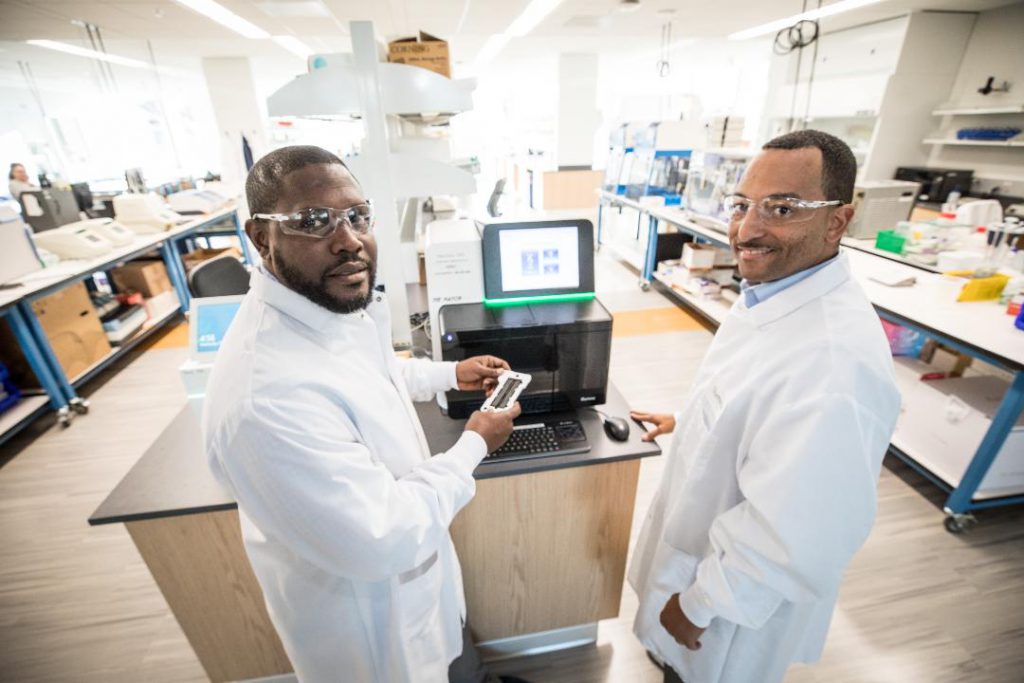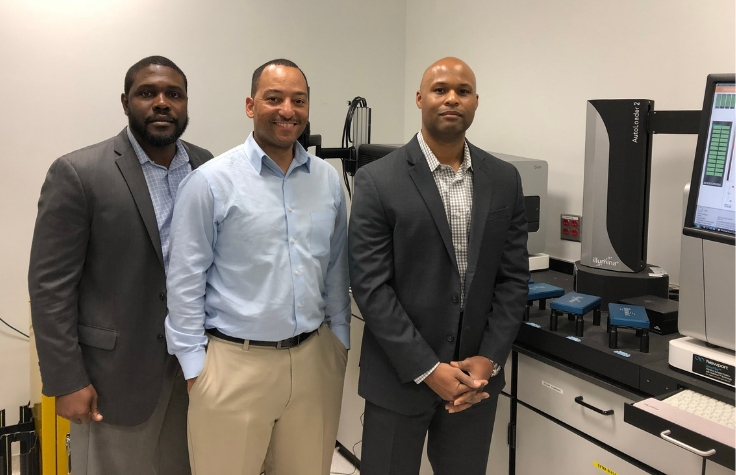
TruGenomix: Science, Innovation and True Grit
By Yuleika De Castro, M.B.A.
Two military veterans and an Ivy League graduate combined forces, driven by a singular goal: to create a genomic biomarker test that can objectively determine risk prediction and diagnosis of Post-Traumatic Stress Disorder (PTSD). They did just that. TruGenomix, Inc. is currently the only service-disabled, veteran-owned, precision genomics company certified by the U.S. Department of Veterans Affairs (VA). The company also holds a license on the only approved patent in the US, Europe, and pending in Canada, for a PTSD gene panel that has been collectively validated in over 500 patients with high accuracy and predictive value. Their mission is to facilitate early detection of PTSD, thus leading to the elimination of all PTSD-related suicides by 2030. The founders of TruGenomix, Inc. also happen to be black.
Yusuf Henriques, M.P.H., Co-founder and Chief Executive Officer of TruGenomix, knows first-hand how PTSD can affect military service members. He is a service-disabled veteran who, as a combat medic, personally witnessed the wreckage of the “invisible wounds of war” and their effects on military service members and those around them.
PTSD is a term used to describe a mental health condition that results from either experiencing or witnessing a traumatic event. Recent reports on PTSD show that more than 700 million people worldwide, 24 million of them in the U.S. with more than 500,000 of those being military service members, are affected.
“A caregiver at my daughters’ school, who was a Marine veteran, committed suicide,” said Henriques. Having seen effects of trauma exposure as a combat medic, the Howard University and John Hopkins grad knew this would be his purpose. After taking off his uniform, his goal became to serve his veteran and military community. According to the VA’s Office of Mental Health and Suicide Prevention 2016 report, an average of 20 veterans and active-duty soldiers take their lives every day. This number has been consistent for the past fifteen years. It was the impetus to become the source of a solution, and he would start by simply reducing that number by one.

Co-founder and Chief Operating Officer, Charles Cathlin, M.P.H, is a recently retired Captain (O-6) with 23-years of service between the U.S. Air Force and U.S. Public Health Service. Armed with an engineering degree from the US Air Force Academy and a Master of Public Health from Uniformed Services University of the Health Sciences, Cathlin held key leadership positions at the DoD and FDA. He also served as Chief of Staff at the Defense and Veterans Brain Injury Center (DVBIC) and Chief of the Radiology and Neurology Devices Branch at Center for Devices and Radiological Health, respectively.
For Cathlin, however, the battle against PTSD is also personal. Originally from New York, he was deployed to Ground Zero following the attacks on September 11, 2001. As he worked to keep his team safe from the resulting environmental hazards, Cathlin took note that many first responders were not doing the same and felt helpless. This sense of helplessness propelled him to take an interest in mental health conditions and the effects of such traumatic events on first responders and military service members.
“I believe the mental trauma following the attacks contributed to the physical illnesses that many still suffer from today,” said Cathlin.

After meeting in 2006, Henriques and Cathlin realized they have more in common than the military or even PTSD. Both men had overcome the challenges of being raised in areas where gang violence was all around them, and maybe, this is the original source of true grit.
“I distinctly remember, at just three years old, walking out of a store and witnessing a man being killed,” recalled Cathlin.
Henriques and Cathlin credit their families for the support, guidance, and resilience to achieve what they have been able to accomplish thus far. Henriques, who is Jamaican, says his parents were a driving force in keeping him on the right path, emphasizing the importance of academic achievement and firm adherence to family values. Similarly, Cathlin recognizes his family’s sacrifices to help elevate him (and his entire family) to higher levels.
Completing the executive leadership team at TruGenomix is Tshaka Cunningham, Ph.D., a Princeton University and Rockefeller graduate who spent the previous nine years working on Veterans health issues at the VA Office of Research & Development studying neurodegenerative diseases as Scientific Program Manager.
Cunningham, recognized as a subject matter expert in the field of genomics and precision medicine, who previously participated as an advisor to the VA’s Genomic Medicine Implementation Program (GMIP), now serves as the Chief Scientific Officer at TruGenomix.
While Cunningham also grew up in the inner city of Washington D.C., his experience was different from that of Henriques and Cathlin. Cunningham grew up surrounded by science. During a time where African-Americans had few opportunities, his grandmother Alfreda DeGraff Simmons worked as a biomedical research scientist at the National Cancer Institute and the Walter Reed National Military Medical Center in Bethesda, MD. She always made sure that he was exposed to science, teaching him advanced laboratory techniques as a child and planting the seed that would help him flourish into who he is today. “My grandmother made sure I had a deep appreciation for scientific methods at a young age,” said Cunningham. He jokes, “I practically grew up in a laboratory!”
The team of three African-American biotechnology entrepreneurs are now on a mission. Through their research, TruGenomix is poised to revolutionize the way screenings for PTSD are done.
Until now, self-reported symptoms and personal, subjective observations have historically served as the only means of detecting PTSD. The stigma still associated with mental illness often discourages people from disclosing the symptoms they suffer. PTSD has been shown to lead to other complications such as alcoholism, depression, and substance abuse. For those seeking to join the military or continue to be an active service member, there is a fear that disclosing this information may impede their career in the military.
Building upon 40 years of available research and technology created by the Icahn School of Medicine at Mount Sinai (ISMMS) and Max Planck Institute (Germany), an essential set of genes was discovered that define an individual’s predisposition to develop PTSD following trauma exposure. In 2016, a US patent was awarded to the researchers behind this discovery, Rachel Yehuda, Joseph Buxbaum, and Florian Holsboer, clearing the way for these genetic biomarkers to be used to develop better tests for PTSD. Henriques became aware of the work supporting this patent during his tenure as a Senior Research Health Scientist in Yehuda’s laboratory at the James J. Peters Veterans Affairs Medical Center. He joined forces with Cathlin to license the patent from Mount Sinai and form TruGenomix. Their goal was to commercialize a product with these specific genes that can determine a risk prediction and diagnosis of PTSD through a simple blood test.

Later, the team made another pivotal connection with The Illumina Accelerator in Silicon Valley. The Illumina Accelerator is an organization connected to Illumina Inc., the market leader in genomic sequencing technology. Illumina is focused on building genomic-based startups, by offering capital, genomics and sequencing expertise, business coaching, and lab space. After an extensive selection process, TruGenomix was chosen as one of only five organizations for the Illumina Accelerator’s seventh funding cycle in 2018.
With access to Illumina’s resources, the TruGenomix team was able to further focus on developing a custom gene panel solution that would be ready for immediate commercialization. As such, while many researchers in the field were still using outdated microarray platforms, TruGenomix’s assay capitalizes on the latest advances in next-generation sequencing technology by using a custom RNA AmpliSeq gene expression panel, that measures the levels of hundreds of different genes simultaneously. This work allowed the scientists to test for risk and diagnosis of PTSD, and possibly gain insights on the genetic signatures of psychiatric conditions such as bipolar disorder, anxiety disorder, and major depressive disorder, which are common co-morbidities to PTSD. The blood test developed by TruGenomix provides an objective and medically precise assessment of the individual’s risk of developing PTSD after contact with a traumatic event. Further, the test will be able to evaluate the level of severity of PTSD once diagnosed.
While 95% of study participants are usually European white males, TruGenomix is committed to diversity. TruGenomix is in the midst of a thousand-patient retrospective validation study on PTSD, which includes a uniquely high representation of diverse populations such as African Americans, Latino/Hispanics, and Women. This distinctive and deliberate, diversity-focused approach reiterates the scientists’ assertion of the need for precision genomics that applies to all patient populations – regardless of race or gender.
“TruGenomix’s long-term goal is to have our genomic biomarker diagnostic test become the gold-standard for PTSD and risk prediction based on its enhanced accuracy and positive predictive value,” said Henriques.
Undoubtedly, Henriques, Cathlin, and Cunningham are on the cusp of a scientific breakthrough that can transform the way mental health diseases are diagnosed. TruGenomix is an example of what can be achieved when the right opportunities are combined with a passion to succeed.

To learn more about TruGenomix or to become involved, visit www.TruGenomix.com

